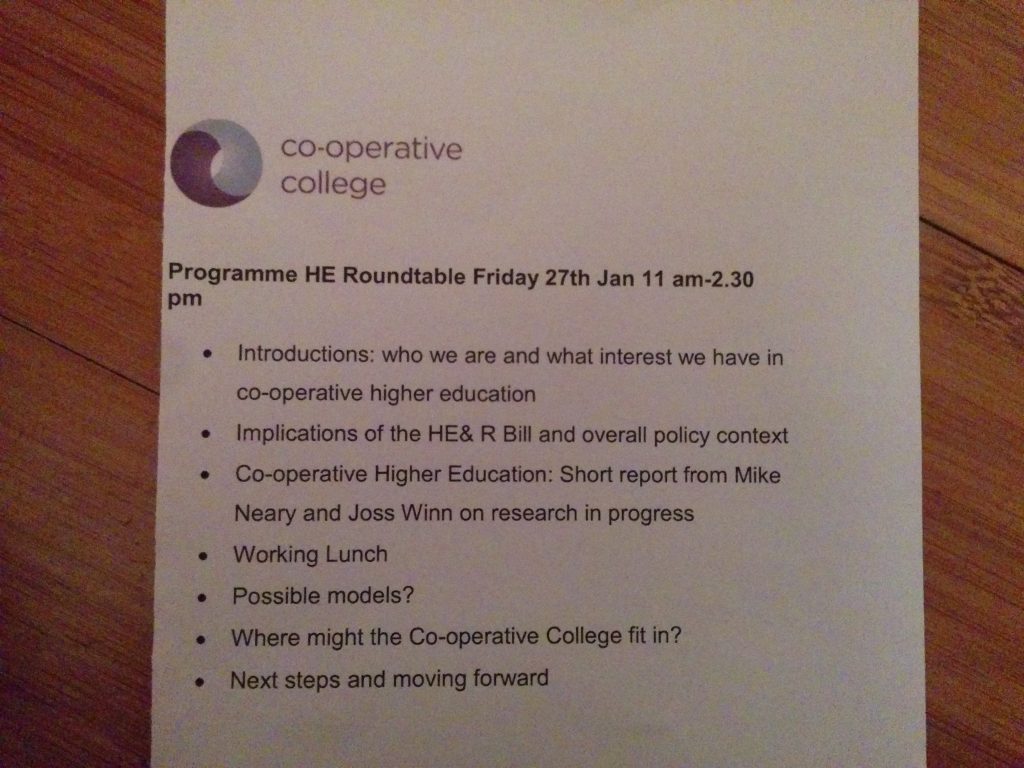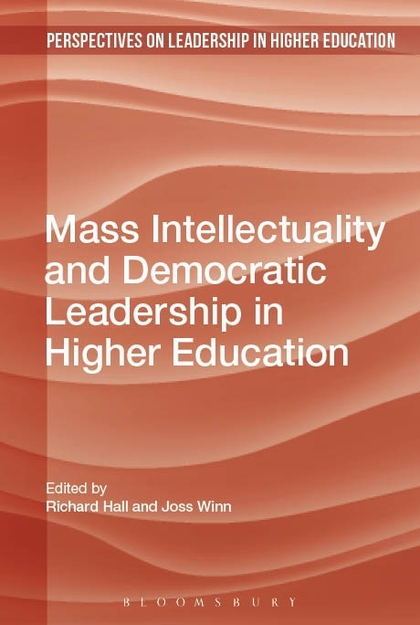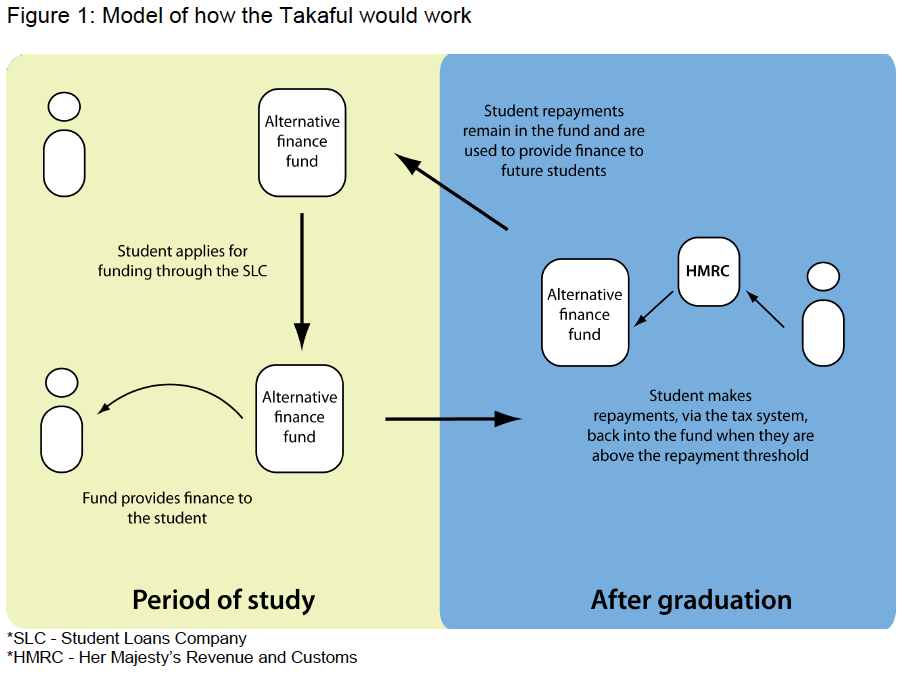Letters from Utopia, first published in Post-16 Educator (84). Download PDF.
“The state of abundance is not a Utopian vision but the real possibility of conditions already in existence.” (Kay and Mott, Political Order and the Law of Labour, 1982, 1)
What follows is a series of short letters written by a student from the University of Utopia. Although a fictional account, the letters are written with the conviction that we are actually living in a state of abundance, rather than the scarcity imposed by the market economy and that global social needs can be met by our existing capacity to co-operate with one-another rather than compete. The five letters are based on our joint research and practice of co-operative higher education which we have been undertaking since 2010. They do not reflect the breadth of the research but instead offer one imaginary account that we are hopeful for and working on. A recently completed project brought together many people to produce a practical and theoretical framework for co-operative higher education, features of which we have tried to embed in the epistolary form that follows. We invite you to also read a recent paper that we have written which discusses our ongoing research in more detail.
Mike Neary and Joss Winn, June 2016.
~~~
Dear Mum,
I am writing to you from Utopia. At least that’s what the first couple of weeks has felt like. Since you and Dad left me at the student housing co-op, I’ve learned a lot about what makes this university different and I’m pretty sure I made the right choice to come here. I know we read the brochures about what makes a co-operative different to other types of organisation but it’s only in the last few days that I’ve really started to get it. The university is made up of four Schools: Life, Machines, Letters and Property. I suppose the main thing I’ve noticed is the emphasis that members of the university place on the importance of democracy and what that means in terms of my role here. Although I’m just a first-year student, it seems that first and foremost I’m a member of the university, just like my teachers. In fact, it’s not just the students and teachers, but everyone is a member with an equal say in how the place runs. At first, I wondered how the place manages to run at all, but during orientation week I got a better sense of the long history of co-ops and how they tend to be good places to live and work and learn. It can’t always be easy, but people seem proud of their co-op and the role it has in society. Although it’s quite a new university, it’s part of an international movement of people who think that ‘common ownership’ (I still don’t really know what this means but it sounds good) and democratic control of their organisations is a good thing. It’s not just the university and my house that are co-ops either: the university canteen, the local health service and even a secondary school next to the university are co-ops, too, and they all try to work together. Oh, yes, I almost forgot… My bedroom furniture was designed and made by students from the university, too! I was told that by some second-year students in my house. They seem like good people. A few of us went out the other night and got to know each other. I met a nice girl called Ellie. She went to a co-op school so she knows much more about how everything works than I do. I’m really excited about being here. Can you tell!?!?!
Lots of love to you and Dad. X
~~~
Dear Mum,
I hope you are well? After four months, this place is starting to become less strange. More familiar.
I am made to feel like a researcher with something to offer, rather than an undergraduate student with everything to learn. There is learning, of course, lots of it and in different situations, not only in lectures, in fact there are no lectures. Last week I was having lunch and my teacher asked me to collaborate on a project about the chemistry of cooking and the politics of food, including the cause of hunger and malnutrition. Afterwards, when we were cleaning up the kitchen, I thought about designing a kitchen that would avoid wasting food. This ties in with another project I am working on, building a house for visitors to Utopia. I want to design a contemporary croft out of concrete. My School: Life, is holding a competition. The best house design is going to be built by the students and teachers. This project connects my interest with concrete as a concept and as a building material. I was interviewing a visitor to Utopia to get ideas for my building. She asked me, ‘what subjects are you studying’. I said, ‘I am not studying subjects. I am studying Life. And next year I am studying Machines’. She was incredulous, not least when I told her we didn’t have exams but produced work to be read and seen in public as acts of collaboration and generosity. I have to be honest but I find my allocated work project less interesting. It’s with the School of Property. I have no interest in law or bureaucracy. I just want to build things. My tutor asked me what laws are needed to build a new society not based on private property but a unity of purpose and social defence. I told him I would think about it. If I get time. I don’t have any time. Or space. I am knackered. The pace of work is too slow. I don’t get to the computers until next year when I start on Machines. Writing letters is part of the pedagogy, or the science of teaching, as they call it here. One of the Schools is called Letters, which extends to the humanities and the arts. My tutor says writing letters allows for more critical reflection which is essential for learning. I am not so sure. My handwriting is rubbish and my favourite pen burst in my pocket so my shirt has an ink stain. I told Ellie it was tie dye. She said, ‘Do you think I am stupid?’ I said, ‘No, I think you are the smartest person I have ever met’.
Lots of love to you and to Dad. x
~~~
Dear Mum,
Thanks for the money you sent me. It is very kind but I don’t really need it here. Other than to buy more soap and some chocolate and fruit and beer.
As you know I was never interested in money, but the idea of the commonwealth is different. It is based on creating a new form of social value based on human purpose in the natural world. Like people and the planet. For now, we can’t avoid life with coinage, so we all make a financial contribution to Utopia’s commonwealth. I raised my contribution from saving some of my wages when I worked before coming to Utopia and some crowdfunding and the money you gave me. As you know this pays for accommodation and meals as well as the teacher’s salaries. The annual accounts are a teaching object in the classes on Property. Money is the universal form of property. The university has reserves from donations and a levy from the international co-operative movement, for whom education is a core principle. My contribution is like an investment in the life of the university and if any profits are made at the end of the year I can draw down a dividend, or leave it in the fund to accumulate. The teachers pay a contribution to the commonwealth from their wages, which mounts up like a pension fund. I can earn money by working in the university to help the teachers teach and on necessary tasks to maintain the buildings. At Utopia doing is promoted above having. I might even leave the university with money in my pocket rather than a mountain of debt. So the Commonwealth is not just an idea but a living source of value. Part of this is experimenting with new forms of social value, like labour time banks and other sharing schemes. I told Ellie that I loved her and I wouldn’t share her with anyone. I believe in free education but not in free love. Does that make me a conservative? I want to be radical, but it is hard.
Lots of love to you and Dad x
~~~
Dear Mum,
I’m pleased that the warmer weather has arrived. I bet you and Dad are enjoying being out in the garden more. It certainly makes my job here more enjoyable as I’ve started to work in the university gardens, too. It’s a funny thing, you know. All members of the university work for it in some way, including students, but it doesn’t feel like ordinary work when it’s an organisation that you collectively own and control. Through this work, I’m getting a different view of the way things run around here, too. There are quite a lot of meetings to discuss all aspects of the University, but we usually come to decisions quite quickly (although some topics can drag on!). Rules really matter though and I’m realising that democracy needs people to be actively involved and have the right information at hand so we can make good decisions. It’s not just our internal rules that I’m learning about but also the way we have to operate within the law and how the law is reflected in forms of regulation and in our university’s administration. It’s all connected, which is why it seems important to understand law and politics and the economy as what my teacher referred to as ‘social forms’, rather than things in themselves (i.e. natural). Does that make sense?
People here are elected for a period to take the lead on things such as running the courses, overseeing money, and representing different types of members at committee meetings. It’s a big responsibility and I heard that last year, members voted to remove someone from their role because they didn’t listen to anyone! He’s gone back to teaching in the School of Property. I was in a seminar the other day where we were discussing ‘bureaucracy’ and it occurred to me that there’s plenty of it here but actually in a good way. It seems to help protect what people care about in their organisation and if someone really wants to change the way things are done, then we can discuss it and vote at the next general meeting (I think that’s how it works, or maybe there are other meetings where it gets discussed first). Well, as you can probably tell, I’ve been here nine months and I’m still figuring it all out. Some days I learn more in a committee meeting than I do in a seminar. Sometimes the committee meetings remind me of the type of discussions that were held in the Occupy movement that we studied last term. That’s a good thing, I guess.
As I mentioned on the phone, I don’t think I’ll be home for summer. It’s been agreed that I’ll be working with one of my teachers on a photography project about concrete buildings (can’t wait!) and Ellie has got a part-time job at her old school, helping run outdoor activities for kids.
Lots of love to you and Dad x
~~~
Dear Mum,
You asked me what have I learned over the last year. I learned universities are not about teaching and learning, but producing knowledge. My teachers talk about knowledge as an object of social value: something much more than value for money. I learned to develop a critical frame of mind. Not just through my own work but in reviewing the work of others. There are no grades or marks here, but a judgement by students and teachers on whether the work is ready for the world. If it is ready, then it gets published or put on show in an exhibition or as a public installation. If not then we redraft and resubmit, pull it apart and put it back together. We are taught to see the review as part of the process of the production of knowledge rather than as an assessment. As an act of collaboration with our teachers and with each other.
All of our work involves collaboration, a sort of intellectual solidarity. This way of working does not forget that we are at the same time individuals in a collective context. We are not all the same, and our idiosyncrasies are allowed to flourish. For example, my interest in concrete as a philosophical concept and as a construction material. Maybe I will become an architect. My favourite building style is Brutalism.
Collaboration extends to other school work like maintaining the buildings. Not out of any sense of idealism about the dignity of labour, but the more of us working together the faster it can get done, especially the more menial and mundane tasks. This sense of solidarity extends beyond the university. Next year I am going to the University of Mondragon as part of an exchange visit, working in their Electronics factory. This will form part of my studentship in the School of Machines.
In the curricula, Machines comes after Life. Life grounds knowledge in a relationship between humanity-in-nature, beyond the human intellectual and the cognitive to include the knowingness of the non-human world. Maybe this is the most important thing that I have learned. Letters deals with art and humanities and the importance of aesthetics. Property deals with different forms of social wealth and how they are expressed in the law and the physical environment.
I also learned about democracy and the importance of everyone having an equal say in how the university operates. Coming to a decision can take a very long time, but when we get there it feels like the right decision. The discussions are a learning process. Sometimes I feel like we have reached the right decision even if I do not agree with it, if that doesn’t sound too weird.
We are encouraged to retain our commitment to the University of Utopia when we leave. They have established a society of friends to support this long term relationship. So, in a sense, students will never leave this place, at least not in our minds and in our hearts.
And I learned about personal commitment and the way in which we can show solidarity towards each other, to the extent that we can become mirrors for each other’s individual needs. For a while Ellie had taken on that role for me, but it is too much for one person. We cried when we realised we were over, but laughed when we saw the world we had opened for each other.
Did you and Dad ever feel like this?
In Solidarity. X
~~~

 Due out in August 2017…
Due out in August 2017…